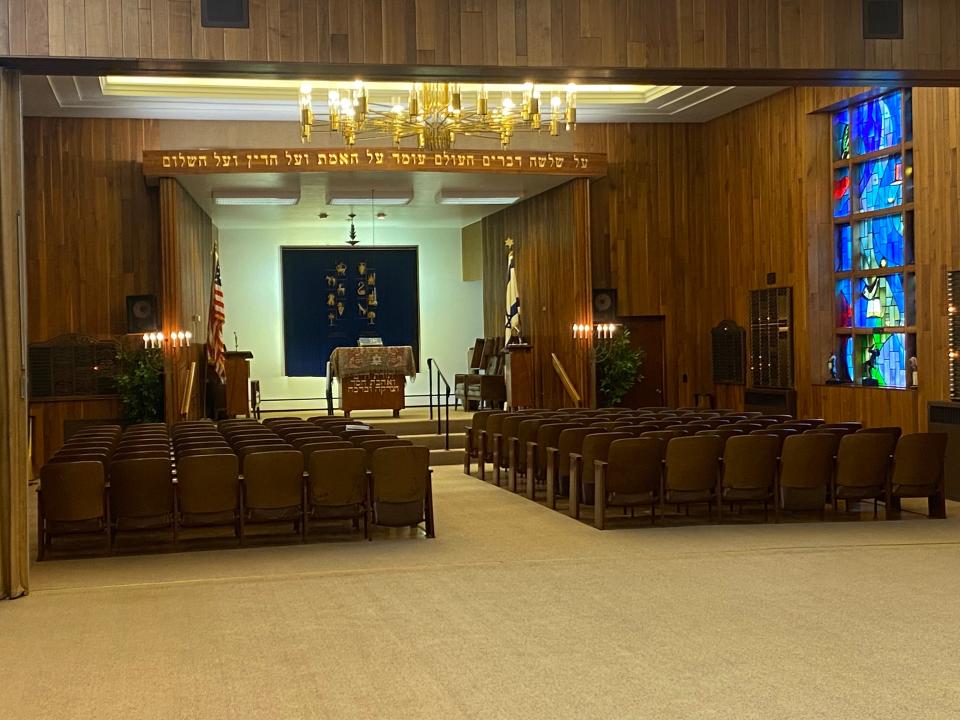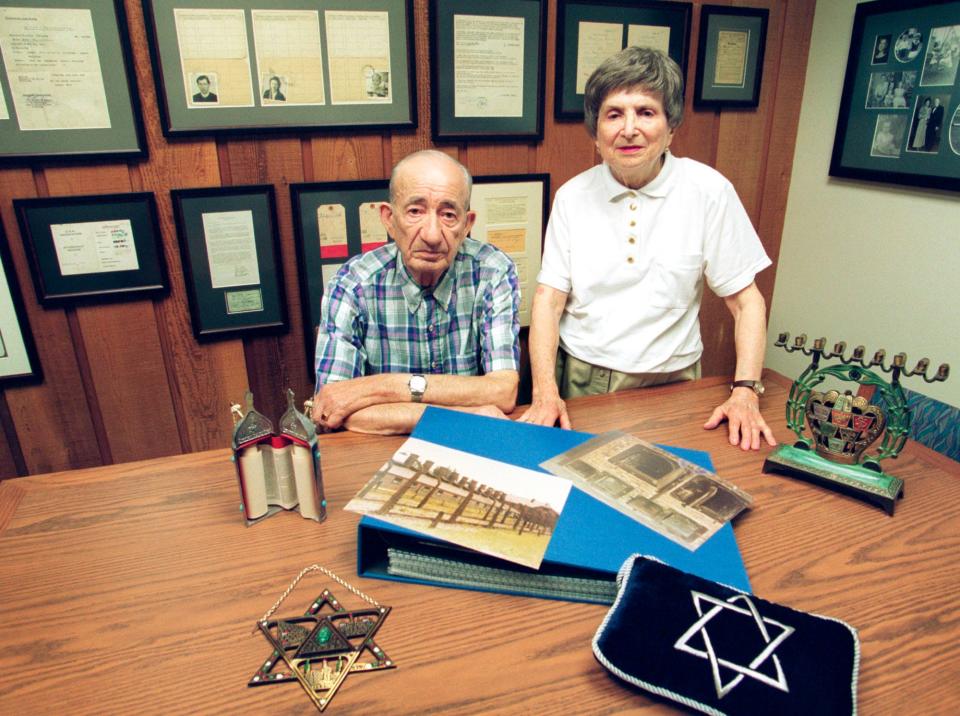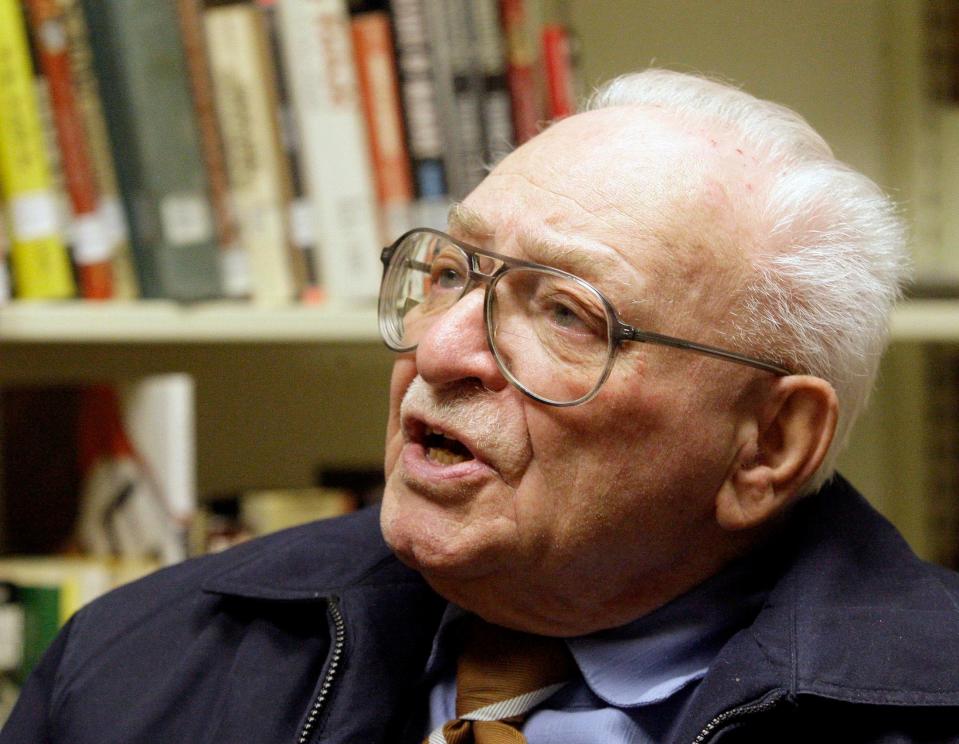Sheboygan's Holocaust survivors will be remembered in a sold-out concert at Congregation Beth El for Holocaust Remembrance Day
SHEBOYGAN - A Sheboygan Symphony Orchestra concert at Congregation Beth El, Sheboygan’s only synagogue, will draw guests from near and far to commemorate Holocaust Remembrance Day.
The Holocaust began 90 years ago and ended more than a decade later, in 1945. Most survivors have now died of old age, including all of the relatively large number who moved to Sheboygan.
For many survivors — such as Sheboygan’s Regina Jacob, who opened up about her story at age 90, before she passed away in 2018 — their belief in the importance of remembering the Holocaust grew in their old age.
What is Yom Hashoah, Holocaust Remembrance Day?
Holocaust Remembrance Day, or Yom Hashoah in Hebrew, marks the anniversary of the Warsaw Ghetto Uprising in 1943. This was the largest uprising by Jews during World War II, including about 700 Jewish civilians.
This April 18, the 27th day of Nisan on the Hebrew calendar, will be the 80th anniversary of the uprising.
Another International Holocaust Remembrance Day as designated by the United Nations is Jan. 27, which marks the anniversary of the liberation of Auschwitz, a concentration camp complex.
Why did Holocaust survivors come to Sheboygan?
After the Holocaust, Jewish people already in Sheboygan sponsored the immigration of a disproportionate number of refugees.
A group called the Sheboygan Committee for New Americans brought 55 Jewish refugees to Sheboygan between 1949 and 1951 and helped integrate them into the community with jobs and housing, according to a 1952 article in the Sheboygan Press.
This number represented the highest ratio of new arrivals to the total Jewish population in the country at that time, the Sheboygan Press reported.
“All the effort and the work and the imagination it took to coordinate these people coming to Sheboygan, it was unique,” said Sam Zelpe, whose parents, both Holocaust survivors, were among those to come to Sheboygan after the war.

Though facing declining numbers, Jewish congregation in Sheboygan will hold a sold-out remembrance
The April 16 concert at Congregation Beth El on North Avenue will feature music by composers who died during the Holocaust and Hebrew Love Songs by Eric Whitacre, performed by the Sheboygan Symphony Orchestra’s String Quartet, Chorus and Chamber Singers.
Mead Library will also have on display at the synagogue items from its Warschau Holocaust Collection about survivors who moved to Sheboygan. The collection is otherwise available to the public at Mead Library.
The concert, already sold out, will be the largest remembrance in Sheboygan in recent years.
Because the number of Jewish people in the area has declined over the years, Anshe Poale Zedek synagogue in Manitowoc closed and three synagogues in Sheboygan have consolidated into one, said Congregation Beth El president Marc Brami, whose father was also a Holocaust survivor.
Beth El on North Avenue is one of the last remaining active synagogues between Milwaukee and Green Bay, he said.
Three Sheboygan Holocaust survivors and descendants on the importance of remembrance

Seven Sheboygan Holocaust survivors contributed materials about their stories to Mead Library’s Warschau Holocaust Collection, including the following three.
Fela Warschau
Fela Warschau, a survivor of the Auschwitz and Bergen-Belson concentration camps, dedicated her later life to educating people about the Holocaust, according to Mead Library materials.
On the importance of remembering the Holocaust, Waruschau said: "Please beware of too-easy schemes. Beware of someone promising you an easy life. Please think that it might come at someone else's pain and misery. Don't get caught up in a current of evil. Try to make the right decisions — not just about your life, but your fellow man."
Robert Maztner
Robert Matzner survived five years in six labor camps, beginning at age 15. A friend helped him record his story in a book “Prisoner 19053: A True Story of a Fourteen Year Old Boy Who Spent Three Years in a Nazi Concentration Camp,” published in 2009.
Matzner “became well known in Eastern Wisconsin for telling his personal account of horrors and survival to schools, churches and other groups,” his obituary read, saying he “cherished being free to worship as he wanted, it was one of the great pleasures of his life to serve as President of Congregation Beth El.”

Morris Zelpe
Morris Zelpe, born in eastern Poland, was taken to do labor in the Soviet Union during the Holocaust and was the only member of his family to survive, his son, Sheboygan resident Sam Zelpe, said. Morris met and married another survivor, Stella Drozdz, in a displaced persons camp after the war. Neither ever returned to their homes.
“My parents were not so thrilled to discuss it,” Sam Zelpe said. “Personally, I don’t think you can overestimate the importance of remembering what happened. It isn’t that long ago. And I think every once in a while people think that we’ve changed, that people in the world are much different.
“In certain ways, maybe that’s true. Certain places maybe that’s true. Certain attitudes may be different. But then you see something like Russia invading Ukraine,” he said.
“Bad things can happen to all kinds of people, anywhere in the world. … How the Holocaust happened, it’s incomprehensible to me. I think it might be incomprehensible to many people. You just can’t fathom how something like this can happen. But the fact of the matter is, it happened.”
More: Reports of antisemitism in Wisconsin remain near record-high levels in 'troubling trend'
Reach Maya Hilty at 920-400-7485 or MHilty@sheboygan.gannett.com.
This article originally appeared on Sheboygan Press: Sheboygan Holocaust survivors remembered in concert at synagogue

